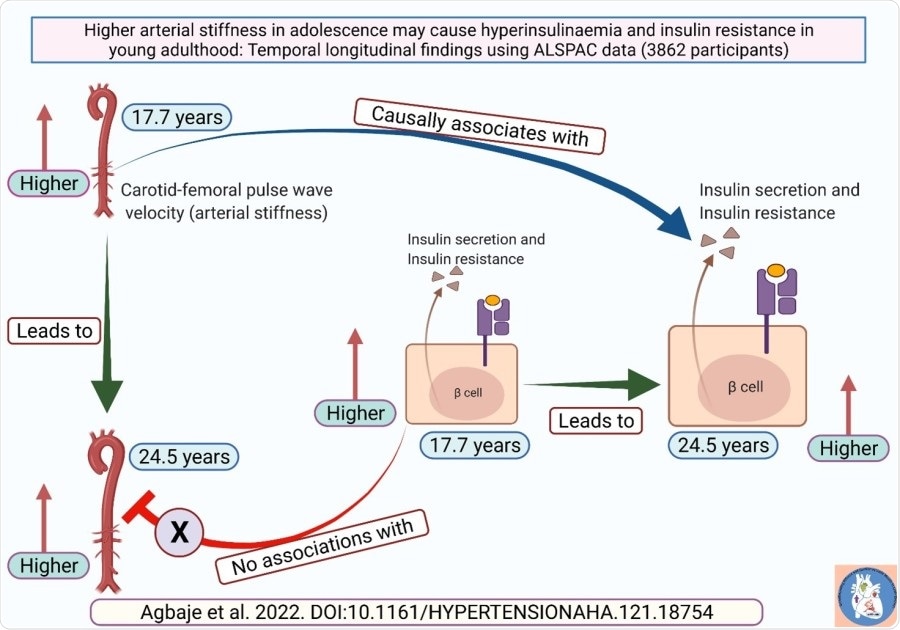Arterial stiffness may be a novel risk factor to be targeted in the prevention and treatment of insulin resistance and dyslipidemia from a young age, a new study published in Hypertension today suggests.

Higher arterial stiffness seems to independently cause hyperinsulinaemia and insulin resistance among adolescents and young adults. The prevention of the risk factors for the development of young-onset type 2 diabetes among the young population may include strategies to reduce arterial stiffness. Image Credit: Andrew Agbaje.
Researchers from the University of Eastern Finland, the University of Exeter, Cardiovascular Engineering Inc., and the University of Bristol carried out the study using data from one of the world's most extensive ongoing prospective birth cohort studies - the Avon Longitudinal Study of Parents and Children (ALSPAC).
Insulin resistance and dyslipidemia such as elevated triglyceride and low HDL-cholesterol are major preventable risk factors for type 2 diabetes mellitus, cardiovascular diseases, and death. Globally, the prevalence of young-onset type 2 diabetes, i.e., type 2 diabetes diagnosed before the age of 40 years, has been on the rise. Moreover, several long-term interventions and clinical trials to prevent and treat young-onset type 2 diabetes have been unsuccessful. Importantly, emerging evidence among adults revealed that arterial stiffness could be a novel causal risk factor in the development of incident type 2 diabetes, but studies among adolescents are lacking. The Lancet Commission on diabetes has recently recommended further research on young-onset type 2 diabetes. Hence, identifying novel pathways in the natural development and pathogenesis of young-onset type 2 diabetes and dyslipidemia may be important for reducing the incidence of these diseases among adolescents and young adults.
In this newly published study, the researchers examined whether pre-clinical atherosclerotic traits such as arterial stiffness temporally precede the development of insulin resistance, hyperinsulinemia, and dyslipidemia. For the first time, over 3,800 adolescents aged 17 years were followed up for seven years and their longitudinal data were analyzed using advanced statistical models to untangle potential causal associations.
The researchers found that arterial stiffness in adolescence may be a causal risk factor for hyperinsulinemia and insulin resistance in young adulthood despite controlling for important risk factors such as smoking, physical activity, body fat, skeletal muscle mass, heart rate, blood pressure, family history of cardiovascular diseases, etc. Likewise, adolescent arterial stiffness appears to temporally precede low HDL-cholesterol in young adults, although with borderline statistical significance. Nonetheless, the 7-year increase in arterial stiffness was positively associated with the 7-year increase in triglyceride, suggesting that arterial stiffness may play a role in the development of dyslipidemia.
Our novel findings are clinically significant for pediatric and adolescent health, in that preventing and treating insulin resistance, young-onset type 2 diabetes mellitus, and dyslipidemia may necessitate strategies to concurrently reduce arterial stiffness, particularly from adolescence."
Andrew Agbaje, Physician and Clinical Epidemiologist, University of Eastern Finland
Source:
Journal reference:
Agbaje, A.O., et al. (2022) Effect of Arterial Stiffness and Carotid Intima-Media Thickness Progression on the Risk of Dysglycemia, Insulin Resistance, and Dyslipidaemia: A Temporal Causal Longitudinal Study. Hypertension. doi.org/10.1161/HYPERTENSIONAHA.121.18754.